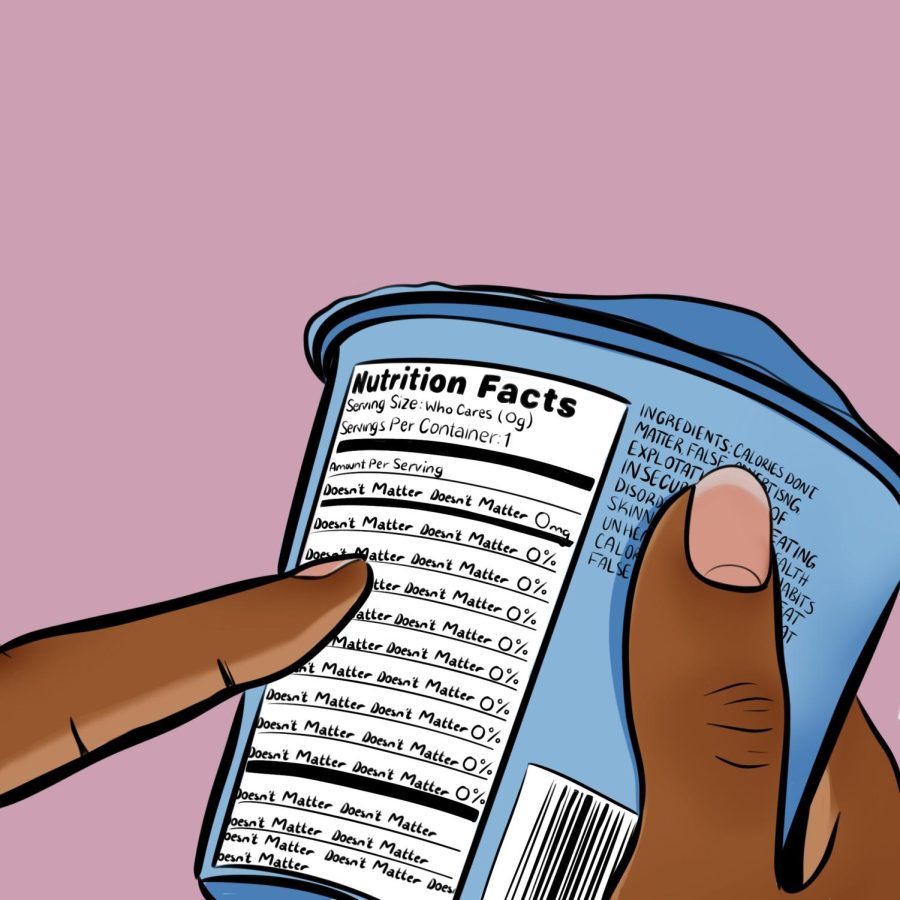Counting Calories Isn’t Nutritious or Delicious
How teaching negative eating habits can have lasting effects
Trigger Warning: mentions eating disorders
As a part of the 7th grade health curriculum, schools are instructed to teach children about nutrition. Many schools teach about the advantages and disadvantages of calories, carbs, fats, proteins, sodium and sugar. After the initial teaching and explanation of these qualities, students are expected to apply them. To track the students’ applications, many schools use apps intended for calorie counting, where students plug in any food that they have eaten throughout the day to see what qualities the foods hold. From this point, students are meant to make healthier choices regarding their diets. For instance, if a student sees that they are consuming a disproportionately high amount of sugar, they may alter their diet to eat less of it, looking at nutrition labels to find where they may “improve” their eating habits. As a general statement, it isn’t bad to want to be healthier as a person, or to want to improve your diet. However, I personally have a problem with the way most curriculums promote this idea to 7th grade children.
For starters, most of the apps place heavy importance on calories, rather than valuing the other qualities of food. I remember the particular app I used opened to a screen that proudly displayed calories in bolded letters. Underneath were our logged calories for the day over our ideal calorie limit. I’m sure there were other nutritional elements to the app, but since calories were front and center, it emphasized that they were far more important. I can say that, as a 7th grader, the only aspect I ever paid attention to was the calorie count. When you first start an account, many of these apps will ask you a question like, “Is your goal to lose weight? Gain weight? Or would you like your weight to stay the same?”, along with questions about your size and age. This is how the app decides what your calorie limit should be. Based on the fact that these apps are used to teach about nutrition, it’s not a huge leap for users to assume that something is wrong with their diet, and that this app should help solve that problem. If something is wrong with your diet, shouldn’t you want to lose weight?
Weight loss, dieting, calorie counting, and many other practices should be viewed on a case-by-case basis, as most people are not going to have the exact same needs. In the early 2000s, there was an increased concern in obesity and obesity in children because of statistics published that brought attention to rising obesity rates. For example, a study from The National Library of Medicine, states, “from 2000 to 2005, the prevalence of obesity (self-reported BMI over 30) increased by 24%”. Obesity continues to be a problem in our country, with 19.7% of children in the US being obese, and obesity being the second leading preventable killer. I assume that many curriculums suggest weight loss to hopefully teach people “better” eating habits and prevent obesity. However, counting calories has been proven to be an ineffective weight loss technique. It may work for certain people, but counting calories is not a universal solution. A Harvard article titled “Stop Counting Calories” states that things such as your gut microbiome (organisms in your gut that affect how many calories your body absorbs from food), your metabolism, and the type or quality of food you eat all dictate how your body may process calories.
Counting calories, expecting weight loss, and then not getting it could also cause negative relationships with food, especially in young children. It is easy for kids of all sizes to feel like they need to lose weight, especially when their school is giving them the resources to do so. Most of the time, children do not have a say in what food they are consuming at home. This could cause them to start skipping meals to reach calorie goals. They may see no results from cutting calories, because that may not be the best way for their body to lose weight. This could cause them to resent their bodies, which can lead to a plethora of different problems including eating disorders, anxiety and depression. In an article titled “Body Dysmorphic Disorder (BDD) and Youth” by Mental Health America they write, “Symptoms of BDD typically begin during adolescence, most commonly by 12-13 years old”. Typically, 12-13 year olds are in 7th grade. At this age, many kids are also dealing with new emotions since their bodies are changing and they are becoming aware of how society views their outward appearance, so why, at the most vulnerable point in their lives, would curriculums promate calorie counting?
I believe that there are many better ways to promote healthy lifestyles, such as teaching about personalized methods of healthy eating and exercising and avoiding blanket solutions. Teaching an ineffective weight loss technique to children who are already insecure does not set them up to live healthier lifestyles. Our diets should vary from person to person, so we should not be showing children that in order to be healthy, they have to live one particular way. In a school setting, we should be supporting children and teaching them healthy habits, and causing them to dislike their bodies is the worst way to do that.
Your donation will support the student journalists of Troy High School - MI. Your contribution will allow us to print our work, purchase equipment and cover our annual website hosting costs.



